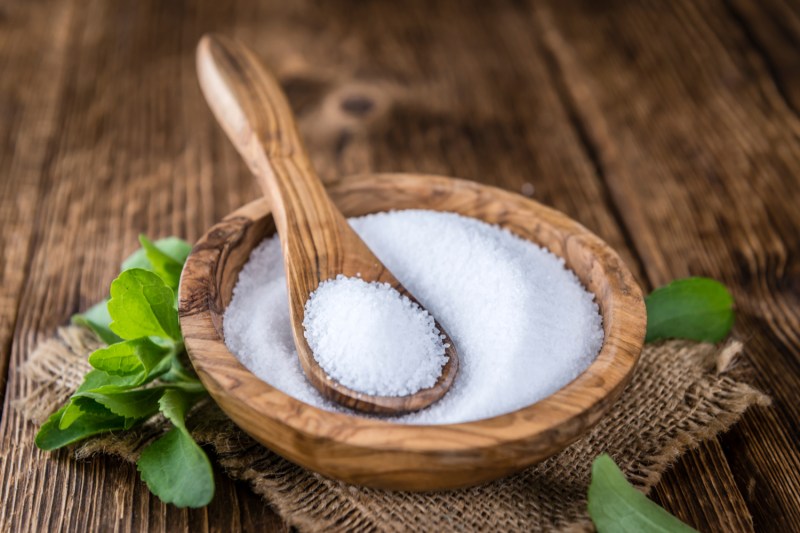
For most people, sugar is the only sweetener they use when making their cup of tea or cup of joe, baking, and cooking. It’s estimated that Americans use an average of 22 teaspoons of added sugar every day. While sugar is naturally available in grains, dairy, vegetables, and fruits, refined sugar has a bittersweet reputation, particularly when it comes to health. Consequently, many people choose to find natural and healthy substitutes for sugar for a range of reasons, including reducing their calorie intake.
Stevia is a sweetener that has come onto the scene over the last few years, especially as low-sugar and ketogenic diets have gained more popularity. Stevia can be used to sweeten your drinks, cereals, and more. Despite this, stevia sometimes gets a bad rap. We found expert advice to help you understand the benefits and risks of this natural sweetener.

What is stevia?
The full scientific name for the stevia we see on supermarket shelves is Stevia rebaudiana (Bertoni). Stevia is a natural sweetener extracted from the leaves of the stevia plant. The plant is part of the sunflower family, and there are over 150 species of stevia, native to Paraguay, that are now being cultivated and used all over the world.
Stevia is about 200 times sweeter than sucrose (sugar), but it contains no artificial ingredients, calories, and carbohydrates. However, not everyone likes its taste — some people say it tastes like methanol because of its bitter aftertaste. Stevia is sweet because of a component it contains called glycosides. It contains eight different glycosides. The most common glycosides are:
- Stevioside
- Steviolbioside
- Rebaudiosides A, C, D, E, and F
- Dulcoside A
Of the eight glycosides, stevioside and rebaudioside A are the most abundant. As of 2023, the FDA has declared stevia leaf extracts as generally recognized as safe (GRAS). In 2019, the European Food Safety Authority also found no safety concerns regarding stevia. Go ahead and indulge in this new sweetener that you can be guilt-free about!

Uses for stevia
There are tons of great uses for stevia in food, and drinks, and even used instead of sugar in baking.
Using stevia in foods and drinks
Stevia is available as blends and pure extracts, which can be powders or liquids. You can use it as you would use refined sugar — simply sprinkle it on your favorite cereal or sweeten your drinks with it. Alternatively, use stevia drops in your coffee, smoothies, yogurt, or water to add flavor. You can also cook with stevia — just don’t use too much of it. Some brands offer a conversion chart to assist with the substitutions in your recipes. Be sure to check the sugar-to-stevia ratio on the product label before adding it to your savory dishes.
Today, more than 5,000 food and beverage products use stevia as an ingredient. Some typical examples include candy, bread, yogurts, sauces, desserts, ice cream, soft drinks, and chewing gum. You’ll even find branded stevia products, such as Truvia, EverSweet, Pyure Organic, and SweetLeaf. When comparing these products, such as Truvia vs. stevia, you’ll see that they’re not all the same. For example, Truvia contains stevia, but it’s extracted from its roots, not the leaves. It also has other ingredients, such as natural flavoring and erythritol.
Baking with stevia
When baking with stevia, don’t expect to get the same results that you would get with sugar. This is because the sweetener doesn’t have the same chemical properties as sugar. Stevia will create a different texture for your bread, cookies, and cakes than sugar will.

Health benefits of stevia
As a substitute for table sugar, stevia sweeteners may offer different health benefits. According to FoodData Central (FDC), it’s a zero-calorie sweetener, making it a better option than calorie-rich sucrose. The sweet-tasting components in stevia occur naturally, and this qualifies it as a healthy alternative for weight loss and diabetes control. Studies have revealed that it has no effect on blood glucose in diabetic patients, allowing them to consume a variety of food options than before.
In the American diet, added sugar accounts for 16% of total calories, and this high percentage contributes to obesity and overweight. Stevia sugar contains nearly zero calories, making it an ideal option to add to your weight-loss diet. It’s even keto-approved — feel free to use it in tea, coffee, and baked goods at home.
Stevia also makes a healthy option for parents who don’t want their kids to consume artificial sweeteners. Excessive calories and sugars are common causes of childhood obesity and weight problems. Today, parents have limitless less-calorific food options, ranging from candy to soft drinks, thanks to stevia. Like most plant-based foods, stevia contains vitamins, minerals, and antioxidants, making it an especially healthy non-sugar sweetener.

Stevia side effects
According to the FDA, refined extracts of stevia, such as Reb A, are safe for human consumption, including consumption by children and pregnant women. This means they can be used in products without posing any risk.
You shouldn’t be worried about experiencing side effects as long as you use highly purified stevia. However, if you’re allergic to sugar alcohol, beware of stevia products that contain it as an ingredient. Sugar alcohol sensitivity can lead to diarrhea, nausea, bloating, and abdominal cramps.
Misuse of stevia products can lead to dehydration, fatigue, headaches, constipation, nausea, overheating, mood swings, low blood sugar, and low blood hypertension. It’s also worth noting that steviol glycosides are a type of steroid, so they can interfere with endocrine system hormones, as revealed in a 2016 study.

Is stevia bad for you?
Generally, stevia isn’t bad if you use it as recommended and in moderation. Just keep in mind that it’s sweeter than table sugar — you’ll need to be careful with your measurements during substitutions.
Whether you prefer powder or liquid stevia, it’s vital to read the product details on the label whenever you use it. You can add this non-nutritive sweetener to your beverages and meals without sacrificing taste. In many food products, it’s listed in the ingredients list as Rebaudioside A (Reb-A), steviol glycoside, or Stevioside.
You can also grow the stevia plant in your home garden and use its leaves to sweeten your beverages and foods. Some people prefer whole-leaf stevia and even claim it’s a safe alternative to its highly refined counterpart. While stevia is an ideal sugar substitute, researchers still don’t comprehend the full range of side effects and risks associated with it. A 2017 review of stevia’s health complications and outcomes concluded that not enough studies had been done to make an informed judgment. As you use it, it’s crucial to adhere to the provided guidelines.
Is it OK to eat stevia every day?
Consuming stevia every day is considered safe if you consume it in moderation. The Acceptable Daily Intake (ADI) amount is 4 mg per kilogram of body weight. For example, this means a person who weighs about 150 pounds can safely consume up to 10 packets per day. The good news is that most of us consume much less than this, using only a packet or two in our tea or coffee. However, if you notice any side effects from consuming stevia, you may wish to consume less or none at all. Using stevia every day can help you cut down your overall sugar intake, replacing sugar in your coffee with this plant-based alternative.

What is the healthiest sugar substitute?
Stevia is just one of many alternative sweeteners and sugar substitutes. Monk fruit is another popular choice that’s derived from Siraitia grosvenorii, or Swingle fruit. Monk fruit, like stevia, offers a natural sweet taste without having an effect on blood glucose levels. The healthiest sugar substitute is also dependent on how your body reacts. For those who experience side effects from stevia, monk fruit is a great alternative. Other sugar substitutes, such as raw honey or maple syrup, may be preferable over sugar itself, but these sugar substitutes still contain sugar, and thus, do have a significant impact on blood glucose levels.
Is stevia banned in Europe?
Unlike the U.S., Europe has placed a few restrictions on stevia-based products due to health concerns. Europe is known in general for having stricter food laws and regulations than the U.S., which often sparks concern for health enthusiasts in the U.S. Pure stevia leaves and stevia extracts are allowed, but companies in the E.U. must follow a few guidelines for the use of stevia in food products. Companies producing and selling stevia in Europe also have more rigorous testing standards that outline rules for allowed pesticide residues, contamination, and other health and safety regulations.



